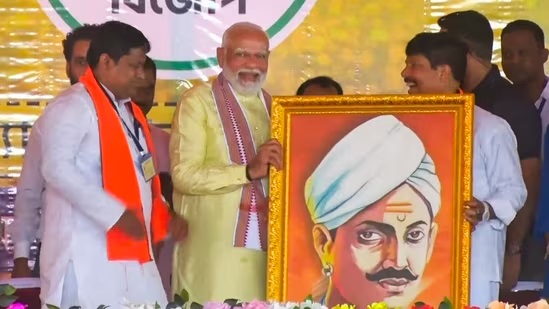Prime Minister Modi’s Guarantees to West Bengal: A Recap of the Election Rally in Barrackpore

News Mania Desk / Agnibeena Ghosh/13th May 2024
During an election rally in Barrackpore, West Bengal, Prime Minister Narendra Modi delivered a series of guarantees to the people of Bengal, targeting the ruling Trinamool Congress and outlining his commitments for the state’s future. Modi’s guarantees covered a range of issues, including religion-based reservation, freedom of religious practices, and contentious legal decisions.
Modi’s first guarantee focused on the assurance that there would be no religion-based reservation as long as he remained in office. This statement appeared to address concerns surrounding the implementation of reservation policies based on religious criteria, emphasizing the principle of equality and meritocracy in governance.
The second guarantee reiterated Modi’s commitment to upholding reservations for Scheduled Castes (SC), Scheduled Tribes (ST), and Other Backward Classes (OBC). By affirming that these reservations would remain intact, Modi aimed to reassure marginalized communities of their rights and opportunities under his leadership.
In his third guarantee, Modi pledged to safeguard the freedom to observe Ram Navami Puja, a Hindu religious festival celebrated in various parts of India, including West Bengal. By promising that nobody would interfere with this religious practice, Modi sought to address concerns related to religious freedom and cultural identity.
The fourth guarantee centered on the Supreme Court’s decision on the Ram Temple in Ayodhya, a contentious issue that has been a subject of legal and political debate in India for decades. Modi vowed that nobody would be able to overturn the Supreme Court’s verdict on the construction of the Ram Temple, signaling his support for the resolution of the long-standing dispute.
Finally, Modi assured the people of Bengal that the implementation of the Citizenship Amendment Act (CAA) would not be revoked under his leadership. The CAA, which grants citizenship to persecuted religious minorities from neighboring countries, has been a source of controversy and debate in India, with critics raising concerns about its potential implications for religious and social harmony.
Modi’s guarantees reflected his efforts to appeal to various segments of the electorate in West Bengal, particularly those concerned about issues related to religion, identity, and governance. By addressing these concerns directly, Modi sought to rally support for his party and consolidate his electoral base ahead of the upcoming elections.
The timing of Modi’s guarantees, delivered during a crucial phase of the election campaign, underscored their significance in shaping the narrative and influencing voter perceptions. As political parties competed for the support of the electorate, Modi’s promises served as a strategic tool to mobilize voters and gain an advantage in a fiercely contested electoral battleground.
In the context of West Bengal’s complex political landscape, characterized by competing ideologies and regional dynamics, Modi’s guarantees assumed added significance. By articulating his vision for the state and outlining specific commitments, Modi sought to position himself as a decisive leader capable of addressing the state’s challenges and delivering tangible results.
The reception of Modi’s guarantees among the electorate remained a subject of speculation, with supporters hailing his assurances as a sign of strong leadership and critics raising questions about their feasibility and implications. As the election campaign unfolded, the impact of Modi’s promises on voter sentiment and electoral outcomes would become clearer, shaping the trajectory of West Bengal’s political landscape.






